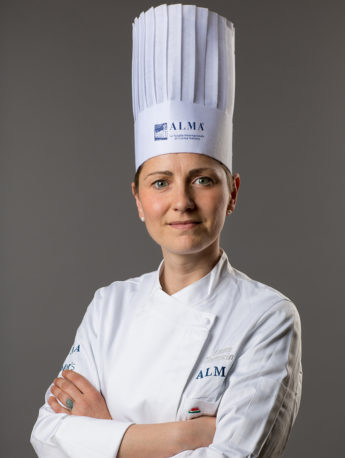
Favourite dish to eat:
pasta with tomato sauce
Favourite dish to cook:
fresh pasta
Cooking in 3 words:
culture, taste, intelligence
Laura Torresin, from Castelfranco Veneto, near Treviso, decided to become a vegetarian when she was 13 years old. It must be said that rather than the result of in-depth research this was an easy escape from the rice with chicken livers that her grandmother served every Sunday. Her adorable and affectionate grandmother was not a great cook but Laura, in order not to disappoint her, would make sure to eat every last grain of rice. Vegetarianism, therefore, must have seemed to her a convenient way out, a divine signal, the perfect excuse to gain her independence, in terms of cuisine, from her relatives.
And so Laura grew up far from steaks and hamburgers, studied, and then went to work in the fashion and sport research and development sector. However, she was missing something, she questioned her choices, and felt that she had to explore a world that she had given up too quickly. She spent her weekends in a tavern, not as a customer but as a hostess, and one day she suddenly decided to change her life. She gave up her work and her diet and flew to Australia. There she worked in a kitchen, dealing with scrambled eggs, suppliers and accounts to be balanced.
Her return to Italy was dictated by the wish to explore the roots of Italian cuisine. Through Mauro Uliassi and Antonia Klugmann she was introduced to a relationship with food that starts from study and then becomes practice. After winning the San Pellegrino Almost Famous Chef competition, she developed a vocation for teaching that would take her from being a student of ALMA’s 11th Advanced Course of Italian Cuisine to teaching the same Course only a few years, and a few work experiences, after obtaining her diploma.
Cooking understood as study, as research, as curiosity, and as a weapon for rejecting the cultural imposition of food soon became the key values that Laura Torresin conveys to her students and that are reflected in her teaching method.
Topic: vegetables and seasonality
